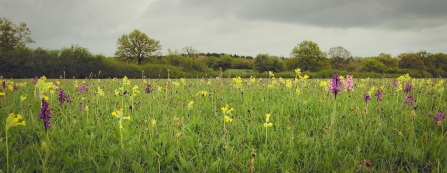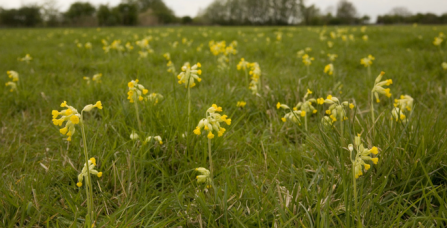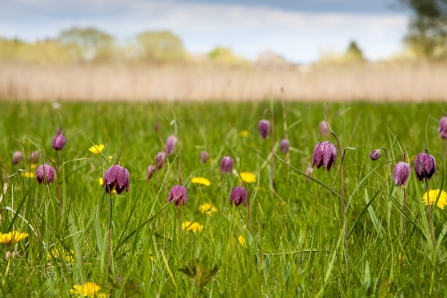
Bernwood meadows by Rhea Draguisky
Iffley Meadows by Michael Brown

Bernwood meadows by Rhea Draguisky
This is a wonderful nature reserve to visit from April to early July when the wild flowers are in bloom and butterflies abound. Cowslips and cuckooflower are some of the first flowers to bloom followed by green-winged orchids later in the spring.
Over 100 plant species have been recorded here thanks to BBOWT's careful management, and it is worth just standing quietly for a moment to take in the buzz and hum of the insects and the spectrum of colour.
You can still see the old ridge-and-furrow pattern here from ploughing in days gone by. Some plants like cuckooflower prefer the wetter furrows while others like meadow buttercup prefer the drier ridges, and this give the stripy appearance to the fields.
The ground is flat but can be uneven and soft after rain, and there are some kissing gates.

Cowslips at Chimney Meadows by Andy Fairbairn
Spring marks the start of these grasslands transforming into wildflower meadows which will be at their peak in early summer. Cowslips start the succession of flowers and the variety grows through the season.
Chimney Meadows is also important as a home for nationally declining wading birds such as curlew, which breed here. Listen out for their distinctive cur-lee calls across the meadow.
There's a new raised observation platform off the Thames Path with views across the National Nature Reserve and over the river to Duxford Old River. Make sure you pay a visit to see what you can spot.
Some paths and the two bird hides are suitable for people with limited mobility. Contact BBOWT for further information on 01367 870904.
Chimney Meadows nature reserve virtual tour (https://youtu.be/6pVBYOT7hGg)
Take a tour of Chimney Meadows nature reserve with Louise and get a taster of this special place

Nightingale by Amy Lewis
This beautiful lake is surrounded by meadows, ponds and sheltered reedbeds, a great place to watch time go by. Look out for the return of our summer visitors - including house martins, and swallows are early arrivals followed by swifts later in the season. You may even be lucky enough to hear a nightingale singing in the dense scrub.
There is a mix of grass and surfaced paths, and it's flat around northern part of lake but undulating to south. There are narrow bridges at this site.

Iffley Meadows by Michael Brown
The sight of thousands of purple and white chequered snake's-head fritillaries at these ancient wet meadows will take your breath away. Each April, Iffley Meadows plays host to a wonderful wildlife spectacle where you can enjoy Oxfordshire's iconic flower, the snake's-head fritillary, in bloom in its natural surroundings.
Before BBOWT took over management of the nature reserve in 1983, a mere 500 of these flowers could be found. As a result of BBOWT's careful management of the site and controlled grazing, numbers of fritillaries have shot up to over 89,000 in a good year - a huge success story. Look out for the results of this year's count later in the spring.
The ground is flat overall but can be rough underfoot in places with wet patches all year and kissing gates/gates. There is also a 30m 1 in 4 ramp from road to towpath.

Little Linford Wood - Jim Asher
Little Linford Wood is a great example of how nature recovers when given the chance. The woodland is now recovering after large parts were clear felled in 1980, just before BBOWT took over the site.
Alongside the younger woodland are some areas of more mature oak and ash with field maple interspersed. Indicators of ancient woodland, such as herb-paris, can be found on the woodland floor.
The wide grassy rides are carefully maintained to create perfect conditions for sun-loving insects such as butterflies so look out for them on warm spring days.
The site is flat but can be muddy when wet and bumpy in places. There are several short bridges, benches and gates on some entrances.

River Pang, Moor Copse by Clive Ormonde
This diverse woodland wildlife treasure trove astride the River Pang is a haven of peace and beauty, renowned for its flowers, butterflies and moths.
In spring, woodland flowers and meadow flowers provide a colourful carpet whilst birds sing their hearts out.
The site is generally flat but the ground is soft after rain and can flood. There are some cross slopes and coarse aggregates on paths, and gates.